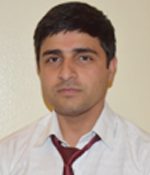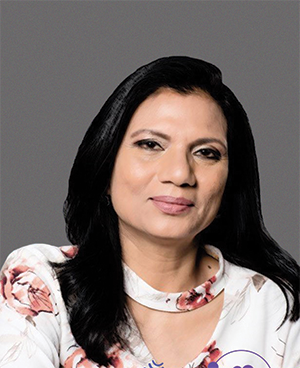Stop Limiting Yourself
By Raju Prasad Ghimire

Raju Prasad Ghirmire
Stopping yourself from making achievements makes your life very uncomfortable and limited. Of course, every person can’t be a genius, but every person can contribute something. New challenges are opportunities for us. Exploring opportunities within difficulties is one of the things that everyone can do. The more we can test our limits and capabilities, the more we will learn about ourselves. Not only can you grasp an opportunity, but also you can create opportunities that other people can grasp.
Of course, challenges are everywhere. Taking on such challenges is an important part of growing and developing as a person. It is a great challenge to become a scientist from a South Asian country due to limited opportunity. However, despite the difficulties, scientists from South Asia contributed to STEM fields and made some major discoveries, including but not limited to the Raman effect (Sir Chandrasekhara Raman), the statistical method of handling bosons (Satyendra Bose), the structure and evolution of stars (Subramanyam Chandrasekhar), the calculation of the cross section for elastic electron-positron scattering (Homi Jehangir Bhabha), and the gauge field theory of electroweak interactions (Abdus Salam).

Archana Sharma
Currently, Dr. Archana Sharma is one of the leading scientists from India, who has conceived and has been steering the GEM upgrade project over the last ten years at the CMS experiment as a principal scientist at CERN. She is also a role model inspiring young students in STEM fields and is paving the way by creating opportunities for others. Following a graduate degree in Nuclear Physics from BHU (Banaras Hindu University), Varanasi, India, Archana received her Ph.D. in particle physics from Delhi University in 1989 and the received her D.Sc. on instrumentation for high energy physics from the University of Geneva in 1996. Dr. Sharma also earned an executive MBA degree from the International University in Geneva in 2001. She is an internationally recognized expert for her experimental work on gaseous detectors for research in high energy physics.
Many scientists throughout the world want to be involved in a world-renowned, successful, and amazing project by any means, and experiments at CERN are flagship projects of the 21st century. Dr. Sharma made it to CERN from India, coming from a humble background, and is now at the pinnacle of her career within one of the largest scientific communities of high energy physicists. However, she started her journey through CERN as a summer intern. But the big question is what drove Dr. Sharma to get there, and the easy answer is her interest, passion, and hard work, and in our conversation, she explained in detail.
- How was your family background and school life?
I was born in Jhansi (Uttar Pradesh, India), and both of my parents were teachers. I grew up like any other middle-class kid in India. I was always an average student during my school. But the support from my parents, close family, and teachers was enormous and enabled me to overcome any challenges, and my family was the backbone for all my success.
- Why science (physics)? Why not another field?
Given encouragement all the time from mentors, I was always passionate to do something meaningful and impactful in life, and I thought physics could be the means, and it made me who I am today. I chose nuclear physics against electronics and solid-state physics at BHU simply due to the “outstanding” set of teachers at the physics department.
- During school, what did you want to be in the future?
During school, I didn’t know what I wanted to do and never thought I would end up at the Mecca of particle physics. However, as I mentioned before, I was ambitious to contribute something to the society by following the footsteps of role models.
- Did you really want to work at CERN?
Just like everyone else, I wanted to be a part of the world-renowned project or a similar place where I can use my ability and knowledge for fruitful outcomes. I found that CERN is one of those projects and I was passionate about it. It is not easy, but not impossible either.
- Was it chance or passion?
Honestly, success by chance is very rare and of course, luck can be lured by hard work and grit of overcoming all challenges one faces.
- When and how did you join CERN?
In 1987 I started to work at CERN as a summer intern for a few months and in that framework, I participated in an instrumentation school, where I received one of the awards, which was to spend a year at CERN. I worked on R&D for 12 subsequent years and then joined the CMS collaboration.
- What were the difficulties?
I was still completing studies and working at CERN on detector development, and this was quite challenging, especially because I was in a foreign country with very few Indians. It was also daunting partly because of the complexity of instrumentation and the experiments. The day-to-day challenges of information management, laboratory schedules, learning, and progressing in a foreign land were massive. There was no scope of being employed as an Indian by CERN as it employs only member state nationals. But in certain exceptional cases this rule can be exempted, and in my case, the requirements of the job did not yield at that point of time an equivalently qualified member state national applicant.
- How did you make it through other difficulties?
Self-commitment to deliver and family support are the keys. Besides that, I grew up in a society where education and emphasis on career was the only way to success, and that pushed me towards my achievement. As one example, when I was close to submitting my doctoral thesis at Geneva University, I was told about a new rule that I must complete certain courses in theoretical particle physics (in French) and that there would be an examination at the end. It was a great challenge since my master studies were already many years behind me, and I was fully immersed in the technology R&D. But working day and night, I managed it, eventually passing the exam with honors. With these small successes, I became confident that all challenges could be overcome if we believe we can do it. It is we who set the limits!
- Are you the only one from South Asia who works as a principal scientist?
To my knowledge, I am the first permanent staff from South Asia, and I am privileged. Recently, more Indians are being employed since India has become an associate member. In addition, there are a number of institutions and physicists from South Asia collaborating with CERN projects.
- What is your suggestion to the high school, undergraduate, & graduate student, and even the young scientist, for being successful in STEM?
Every person has a hidden Einstein inside with huge potential. Failures are stepping stones and obstacles are the first steps towards achievement. Youngsters should not give in to the allure of “fast job and big money”, a common trend. Please keep in mind that if anyone can do it, you can do it too. Of course, the first thing to examine is if you wish to follow the path of a scientist. If you wish to go for “fast job and big money”, it’s totally honorable since the choice is made by yourself. It’s your happiness eventually that counts!
- Any other suggestions for success?
Start building your “career capital”, your experience in the field where you want to work. The path will open up automatically if you will not stop doing everything in your power towards achieving your goals. Make yearly goals, make daily goals, and review them every few months. Success cannot be far away!
Archana is the founder and leader of CMS GEM collaboration, which exploits one of the most sensitive detectors for trigger and tracking in the CMS experiment at LHC with very high discovery potential. The author and co-author of over 1000 publications, Ms. Sharma is invited regularly for talks in international conferences and public addresses in various science and technology events. Recently nominated as a Distinguished Lecturer at the US-based IEEE, she has collaborated at events at the ILO Geneva and World Communication Forum at Davos as spokesperson for diversity and excellence in scientific communication.
In summary, as Dr. Sharma thinks positively and keeps working with diligence in her field, she has been able to set an example for us to make a difference. If you're unsuccessful, you're not pushing your abilities, and if you're not pushing your abilities, you're not improving! Achievements come by accumulating daily tiny doses of failures and overcoming them.
